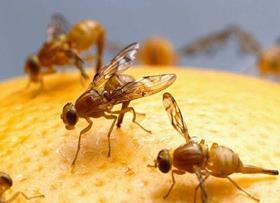
Australia’s National Fruit Fly Council (NFFC) will continue to run a project coordinating fruit fly management in the country over the next five years.
The strategic advisory body has secured funding from Hort Innovation to deliver stage four of the project.
The NFFC – which consists of federal and state government officials, industry representatives and research funders – will work with growers and fruit fly management community groups across Australia to control pest incursions on a national scale.
“There is real value in having industry and government stakeholders in one room to address fruit fly issues at a national level,” said Byron De Kock, head of research and development at Hort Innovation.
Stage four of the project will provide a national strategic direction to manage fruit fly in Australia, including managing the risk of exotic species to support a national system for trade and production. It will prioritise research and development activities to meet fruit fly management needs.
The project will also facilitate communication and cooperation between governments, industries, researchers and communities to progress strategically important national fruit fly issues.
“Phase 4 will continue to build on a considerable body of work in recent years, which has increased national engagement and identified priorities to strengthen the national fruit fly system and Australia’s trade position,” said Stuart Burgess, NFFC manager.
Major achievements of phase three of the project (delivered between 2018-2021) include the production and launch of the National Fruit Fly Strategy 2020-2025 and annual implementation plans. It also saw the delivery of the 2021 National Fruit Fly Symposium, which brought together fruit fly stakeholders across Australia.
The project is a joint initiative between Plant Health Australia (PHA) and Hort Innovation, with co-investment from state governments and horticultural industries.
“Horticulture’s contribution to Australia’s Ag2030 goal of A$100bn in production by 2030 relies on pest management systems to support increased productivity, market access and diversification, and our reputation for high quality and sustainable produce,” said Mila Bristow, national manager performance and innovation at PHA.



